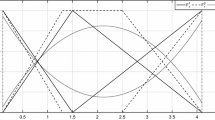Abstract
The available information in some decision situations may be vague or imprecise, and the involvement of human experts, who usually manage qualitative information, results essential to address the underlying uncertainty in such contexts. However, human decision-makers are rationally bounded, particularly when the decision processes involve risk and uncertainty. To model human stakeholders’ behavior in such situations, the TODIM method (Portuguese acronym for Interactive Multi-Criteria Decision-Making) based on the Prospect Theory was developed to address multi-criteria decision-making (MCDM) situations. Even though the classic TODIM method was adapted to manage fuzzy information and, consequently, to model uncertainty by using linguistic labels, that proposal neglected the management of more complex linguistic expressions able to represent the experts’ hesitancy among several linguistic labels, which is quite common due to the increasing complexity of decision problems. Therefore, this contribution introduces a multi-criteria group decision-making (MCGDM) model based on fuzzy TODIM dealing with Extended Comparative Linguistic Expressions with Symbolic Translation (ELICIT) values, which were recently proposed to model such hesitancy and perform precise computations without losing the interpretability of linguistic information.
This work is partially supported by the Spanish Ministry of Economy and Competitiveness through the Spanish National Project PGC2018-099402-B-I00, and the Postdoctoral fellow Ramón y Cajal (RYC-2017-21978), the FEDER-UJA project 1380637 and ERDF, by the Spanish Ministry of Science, Innovation and Universities through a Formación de Profesorado Universitario grant (FPU2019/01203) and by the Junta de Andalucía, Andalusian Plan for Research, Development, and Innovation (POSTDOC 21-00461).
Access this chapter
Tax calculation will be finalised at checkout
Purchases are for personal use only
Similar content being viewed by others
References
Chen, C.: Extensions of the TOPSIS for group decision-making under fuzzy environment. Fuzzy Sets Syst. 114(1), 1–9 (2000)
García-Zamora, D., Labella, A., Rodríguez, R.M., Martínez, L.: Nonlinear preferences in group decision-making. extreme values amplifications and extreme values reductions. Int. J. Intell. Syst. 36(11), 6581–6612 (2021)
Gomes, L.F.A.M., et al.: An application of the TODIM method to the multicriteria rental evaluation of residential properties. Eur. J. Oper. Res. 193(1), 204–211 (2009)
He, W., Dutta, B., Rodríguez, R.M., Alzahrani, A.A., Martinez, L.: Induced OWA operator for group decision making dealing with extended comparative linguistic expressions with symbolic translation. Mathematics 9(1), 20 (2020)
Ishizaka, A., Nemery, P.: Multi-criteria decision analysis: methods and software. John Wiley & Sons (2013)
Kahneman, D., Tversky, A.: Prospect theory: an analysis of decision under risk. In: Handbook of the fundamentals of financial decision making: Part I, pp. 99–127. World Scientific (2013)
Labella, A., Rodríguez, R.M., Martínez, L.: Computing with comparative linguistic expressions and symbolic translation for decision making: ELICIT information. IEEE Trans. Fuzzy Syst. 28(10), 2510–2522 (2019)
Martínez, L., Rodriguez, R.M., Herrera, F.: The 2-tuple Linguistic Model. Springer, Cham (2015). https://doi.org/10.1007/978-3-319-24714-4
Rodríguez, R.M., Labella, A., Martínez, L.: An overview on fuzzy modelling of complex linguistic preferences in decision making. Int. J. Comput. Intell. Syst. 9, 81–94 (2016)
Rodríguez, R.M., Martínez, L., Herrera, F.: A group decision making model dealing with comparative linguistic expressions based on hesitant fuzzy linguistic term sets. Inf. Sci. 241, 28–42 (2013)
Zadeh, L.A.: The concept of a linguistic variable and its application to approximate reasoning-i. Inf. Sci. 8(3), 199–249 (1975)
Zadeh, L.A.: Fuzzy logic= computing with words. In: Computing with Words in Information/Intelligent Systems 1, pp. 3–23. Springer (1999). https://doi.org/10.1007/978-3-7908-1873-4_1
Author information
Authors and Affiliations
Corresponding author
Editor information
Editors and Affiliations
Rights and permissions
Copyright information
© 2022 The Author(s), under exclusive license to Springer Nature Switzerland AG
About this paper
Cite this paper
Labella, Á., García-Zamora, D., Rodríguez, R.M., Martínez, L. (2022). Fuzzy TODIM for ELICIT Information. In: Kahraman, C., Tolga, A.C., Cevik Onar, S., Cebi, S., Oztaysi, B., Sari, I.U. (eds) Intelligent and Fuzzy Systems. INFUS 2022. Lecture Notes in Networks and Systems, vol 504. Springer, Cham. https://doi.org/10.1007/978-3-031-09173-5_48
Download citation
DOI: https://doi.org/10.1007/978-3-031-09173-5_48
Published:
Publisher Name: Springer, Cham
Print ISBN: 978-3-031-09172-8
Online ISBN: 978-3-031-09173-5
eBook Packages: Intelligent Technologies and RoboticsIntelligent Technologies and Robotics (R0)




